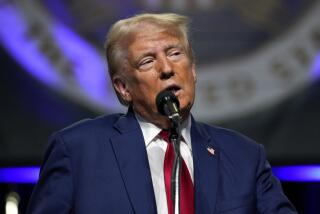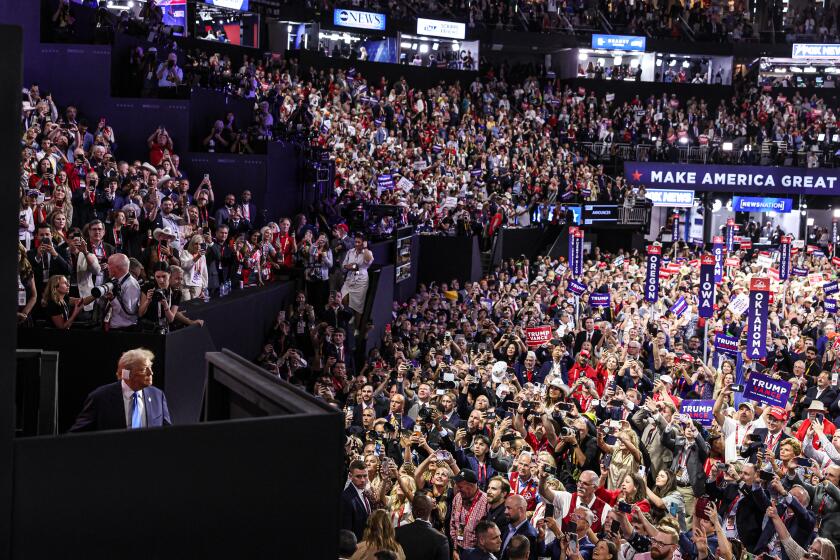Democrats Reject Plan for Spring Presidential Caucus : Politics: Backers hoped to beef up state’s role in selection of White House nominee. But critics said undertaking would cost too much money and effort.
The state Democratic Party rejected a proposed March, 1992, presidential caucus Sunday, acceding to party leaders’ concerns that the labor-intensive undertaking would drain money and attention from the effort to elect a President.
The spurned proposal, touted by some party activists for the last six months, would have allowed Democrats to elect a portion of their 462 convention delegates in spring caucuses, with others selected after the traditional June primary.
Backers contended that the move would raise California’s voice in the election process. Because of its late position on the electoral calendar, the state has been virtually silenced when it comes to selecting a presidential nominee, a fact that has long frustrated organized political activists.
But by a show of hands, a majority of the 258 party board members meeting in Los Angeles opted to retain the current system, under which delegates are chosen via the June primary. While they did not vote on it, most also seemed intent on pushing for legislation that would move the primary itself to March.
A bill that would give California an early, bipartisan primary is expected to be sent from the Assembly Ways and Means Committee to the full Assembly within the week, its sponsor, Assemblyman Jim Costa (D-Fresno), told the delegates.
Before the vote, Costa argued that approval of an early caucus would undercut efforts to move the primary. He described the caucus plan as potentially “the final nail in the coffin” for his bill.
“The bill, I think, at this point in time, is still very much before us,” he said. “The possibility (of an early primary) is still very real.”
Despite Costa’s plea, the caucus proposal was doomed by more basic concerns. Party leaders both nationally and within California privately belittled the proposal, saying that it would costs hundreds of thousands of dollars that the party--currently operating at a deficit--does not have. Others feared that party activists were not up to the massive logistic demands of a caucus system, which would require several gatherings in each of the state’s assembly districts.
Rosalind Wyman, a former Los Angeles City Council member and a prominent Democratic fund raiser, told the delegates that organizing a caucus would divert focus from the general election.
“We should spend the money to elect the nominee after they’re nominated,” Wyman said. “That’s our job.”
Caucus supporters tried unsuccessfully to play on frustrations created when candidates come here to raise money but rarely--because of the late primary--meet with voters until after the nomination is secured.
“Do you want to have the presidential candidates come here and campaign early in the process? Or do you want the presidential candidates to continue to raise 50% of all their money from California and spend it in other states?” asked Jim Clark, a caucus proponent.
Of the 462 California delegates to the Democratic convention in New York City next summer, 227 will be elected at the district level. Under the caucus proposal, 114 delegates would have been chosen in March, with another 113 elected in the June primary. The remainder of the delegation is made up of appointed delegates and elected officials.
The defeat of the proposal shifts attention to the Costa bill. According to strategists from both the Democratic and Republican parties, members of the Legislature are likely to postpone a final vote on the bill until September.
A sticking point is the possible placement on the same ballot of voter initiatives. Because Democrats are likely to have a contested primary, their voters would be expected to turn out in greater numbers than Republicans, who presume they will have George Bush on the ballot. That, Republicans fear, would benefit Democratic-oriented initiatives on the ballot.
By September, however, officials will be able to determine whether any measures are headed for the ballot. If no initiatives are circulating, the odds of a bipartisan agreement to move the primary will improve.
The convention of the party’s executive board, which began Saturday, was burdened with hopes for a successful presidential campaign next year--and reminders of the failure of recent Democratic efforts to capture the presidency.
“We stand here today as a majority party that has not appointed a U. S. Supreme Court justice since Thurgood Marshall (in 1967),” said state party Chairman Phil Angelides.
“This is not the easiest time to be a Democrat, in the sense that this is the time that really tests people’s commitment.”
More to Read
Get the L.A. Times Politics newsletter
Deeply reported insights into legislation, politics and policy from Sacramento, Washington and beyond. In your inbox three times per week.
You may occasionally receive promotional content from the Los Angeles Times.







